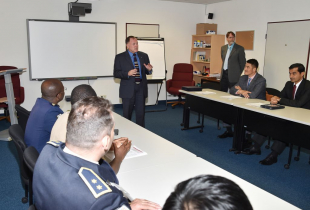
The 2021 Hybrid STANAG 6001 Testing Workshop: Exploring Current Digital Technologies and the Impact on Language Testing
By Andrea Gjorevski
Partner Language Training Center Europe
George C. Marshall European Center for Security Studies
GARMISCH-PARTENKIRCHEN, Germany (Sept. 20, 2021) – The Partner Language Training Center Europe, George C. Marshall European Center for Security Studies, successfully accomplished a first: hosting a hybrid event for the annual STANAG 6001 Testing Workshop Sept. 7-9. This workshop, now in its 11th year, is a vital way for NATO and partner nation language testing experts to come together to standardize their national STANAG 6001 language testing exams.
The event drew representatives from 23 different nations, with 35 language testing professionals attending virtually and 18 experts participating in person to discuss various topics related to the theme: “The impact of innovation and current digital technologies on STANAG 6001 testing.”
The Marshall Center German Deputy Director, Air Force retired Brig. Gen. Helmut Dotzler, opened the workshop by sharing his experiences at NATO SHAPE, underscoring the need for language interoperability as the basis for effective communication at all levels. Dotzler spoke of NATO’s emphasis on standardization and acknowledged the challenges faced by language testing experts in developing their national tests to NATO standards. He commended the group for their excellent work and dedication to language testing over the years, as well as noting the tremendous value their work has on NATO.
The three-day workshop was organized into morning sessions for in-person participants and afternoon sessions for those attending virtually, taking into account the multiple time zones of the online testing community. Each morning, workshop participants engaged in hands-on activities designed to provide opportunities for the experts to share experiences, challenges, and ongoing questions involving issues surrounding testing using digital technologies. Afternoon sessions opened the dialogue up to the online audience and involved all participants in hybrid panel discussions and presentations.
In the first workshop, led by Romanian Col. Corina Ispas, participants discussed national writing test practices and rating procedures, analyzed survey results from a pre-workshop questionnaire and discussed implications for testing writing online. “Meeting in person to discuss about issues all nations needed to confront was useful not only in the sense that some could find answers to current problematic aspects in reference to testing, but also in the sense of maintaining full cooperation and standardization amid NATO member countries that are concerned with testing IAW STANAG 6001 at high qualitative standards,” said Ispas.
The following day, Merit Kompus, one of the testers from Estonia, conducted a workshop aimed at sharing experiences with remote versus in-person speaking tests. Participants engaged in a discussion on principles of best testing practices and how online testing has had an impact on test validity and security.
In the third workshop, Dr. Ray Clifford, Senior Advisor to the Bureau for International Language Coordination, shared his expertise on essential components of computer adaptive reading tests. Clifford’s workshop, conducted in two parts, introduced participants to advanced concepts in test design, including current research on alternative branching and scoring procedures.
The first afternoon panel discussion introduced the topic, “Changing expectations of the testing population,” and was facilitated by four in-person panelists and one virtual panelist who each shared their unique experiences. Panel leader Gerard Seinhorst from the Netherlands remarked, “The workshop gave many new insights in the technical and security challenges related to online testing of language proficiency for high-stakes purposes.” Other panels discussed the impact of advances and digital technologies on test development processes, and test administration, both complex issues in the field of language assessment.
Additional highlights of the hybrid event included a presentation of an innovative project: the creation of a shared item-bank developed through the collaboration of seven nations. Following this was a demonstration of a speaking test norming session involving five participants from four nations. Both of these novel approaches to multinational testing cooperation show the potential for participants to engage in new, exciting collaborations with other national testing teams.
Although hosting and organizing workshops along with other language-related events is not new for the PLTCE language experts, who regularly conduct NATO-accredited courses such as the Language Testing Seminar and Advanced Language Testing Seminar, conducting a hybrid event of this scope and size was something quite different. Workshop planners wanted to ensure virtual participants felt as engaged in the event as in-person participants. Comments from the virtual audience proved that the workshop succeeded in this endeavor. “Superb organization, thought-provoking content, and fantastic presentations! Thank you!” said Karen Sacre from the U.S.
Branka Petek, the Chair of the Bureau for International Language Coordination, summed up the event, stating, “It is really important for BILC to continue organizing the international events where English teaching and testing experts from NATO and partner nations can meet, exchange experience and standardize testing. This year's testing workshop was particularly important as it was the first in-person event after the pandemic started and it gave the opportunity to participate to those who were still unable to travel. This proved to be a very good decision as a number of nations joined online and therefore actively participated in the event. We all appreciated the efforts of PLTCE team who made this event possible.”


